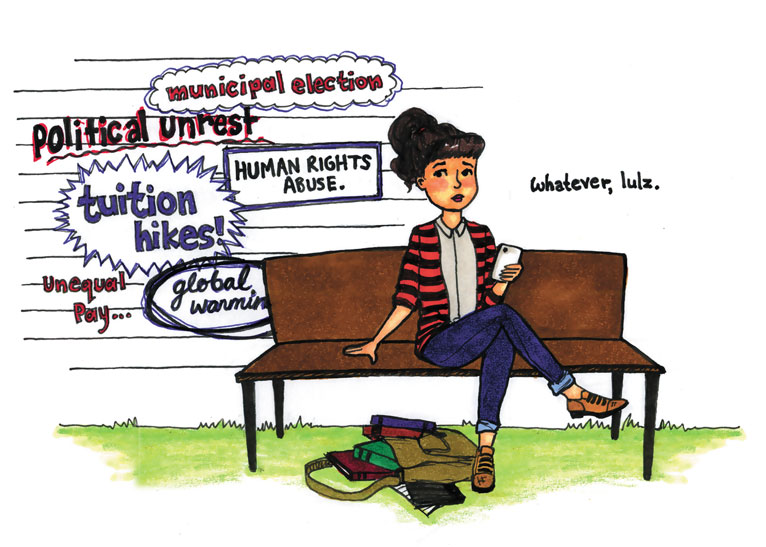
Students need a community to care
By Brittany Haines, November 20 2014 —
Student apathy on campus has a lot to do with a campus community that’s small at best and non-existent at it’s worst. Even with countless clubs, groups and events that give students the opportunity to join and support a cause they believe in, turn-out and political engagement are low. We’re still apathetic.
At the University of Calgary, the Students’ Union has trouble getting people to sign a petition asking our government not to raise our tuition — hardly a far-away or abstract issue.
Even an issue that takes student money isn’t enough to break through our apathy. Faculty-specific tuition increases will almost certainly go through. If we can’t get students to care about their own money, how can we expect students to engage with important local and global and political issues when they aren’t in school?
When students can’t connect with each other on tangible issues, it’s easy to wonder if there are any issues that students do care about. And even if we do care, Albertan students aren’t likely to stage a sit-in.
Students have the ability to form legitimate political movements. The 1960s saw students as the face of American protests against the war in Vietnam. In France, student protests in 1968 shut down the capital city of Paris. The mass engagement of student unions against South African apartheid pressured governments to sever ties with the white-supremacist government. Even today, student movements in places like Chile and Hong Kong are genuine political organizations with mass support and well-developed political platforms.
Activism requires students to be vulnerable and open themselves up to the possibility of failure. It’s difficult to put all of your energy into a fight that could end with no one supporting you and nothing changing.
Apathy happens when people aren’t interested or concerned about an issue. The best way to combat apathy is to connect with one another so we can feel like we’re part of a community.
Students are apathetic because we feel alienated from politic processes. We’re economically vulnerable and often misrepresented in the political sphere. We don’t feel like fighting back will make a difference, so we don’t bother. It’s probably a better use of our time to study more for our statistics class than attend a rally or write a letter to a provincial minister. If our actions never result in tangible change, it’s difficult to stay motivated.
Communities allow us to keep pushing forward even when it’s a struggle. Connecting with one another is a way to prove that we care. If you feel like you’re a part of a group, decisions that affect other people will matter to you. When you feel isolated and alone, you care less.
If we want our communities to survive, we need to make sure the values that hold us together — civic engagement, accessible education — also survive.
The protest at the legislature on Monday Nov. 18 was proof that students are willing to engage with politics when they feel like they’re part of a community. Students were willing to pick up signs and stand on the steps of the legislature because our student leaders made it clear that market modifiers were an issue for all of us. Being part of a community emboldened students to take action, even a small gesture on an issue that was much bigger than a student protest had the ability to be.
We need better communities and we need people to listen to us when we speak. Apathy can’t be used as an excuse for students to give up. It matters when students are politically engaged on important issues, even if it’s just a small group of people.
Students are valuable stakeholders in a lot of issues. We’re apathetic because we’ve never had reason to trust that anything else would help. But it’s not just up to people already in positions of power to consult with students. We have to demand that we’re taken seriously.
If we’re all apathetic, we can’t change anything. It takes a lot of people to force things to change, but fighting back is a better use of time than complaining that no one takes us seriously.
